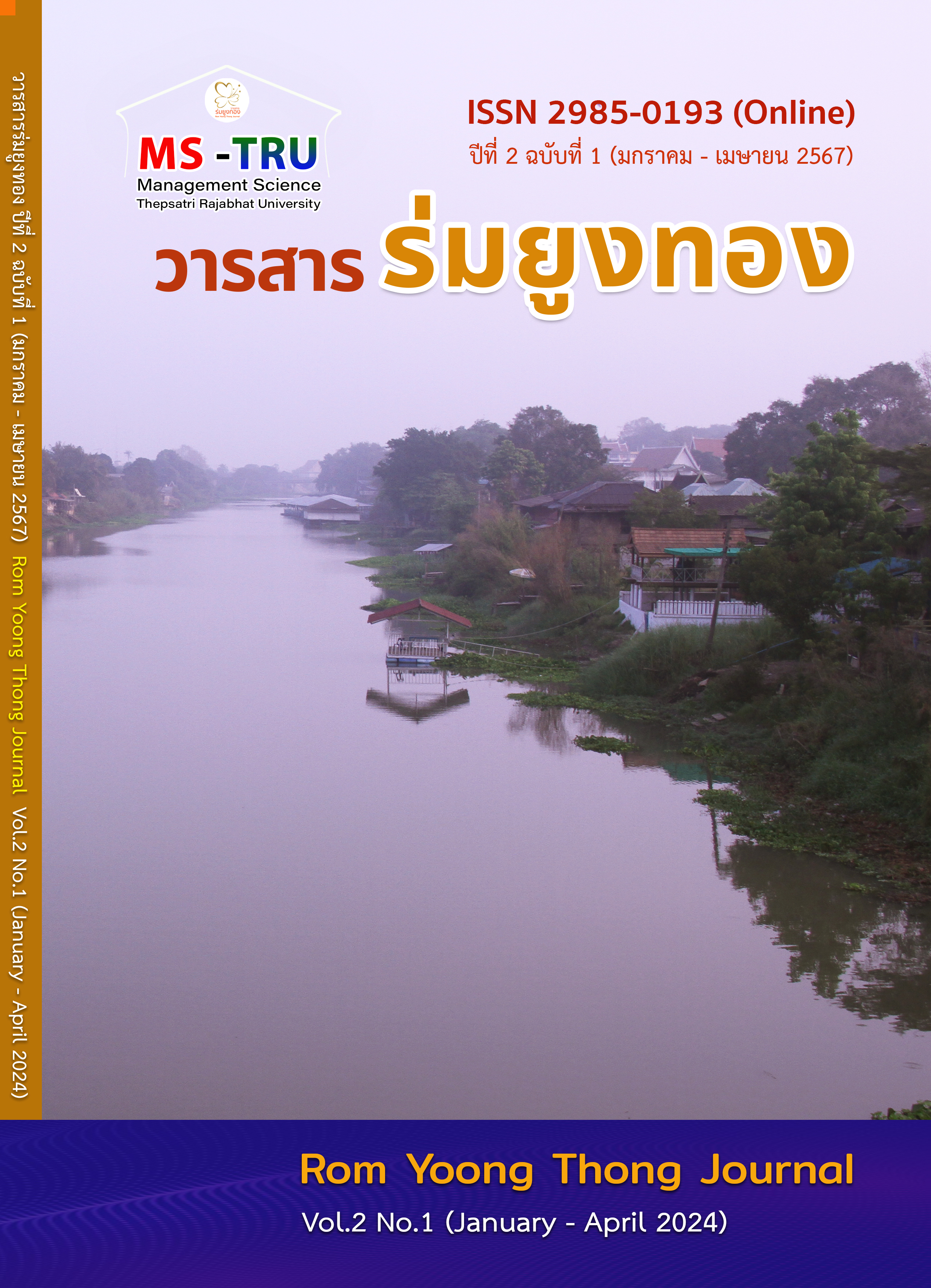Generation Alpha Development Policy and Strategy in the Digital Era: A Thai Perspective
คำสำคัญ:
Generation Alpha, Development, Policy, Strategy, Digital Eraบทคัดย่อ
While Generation Alpha (the cohort born after 2010) is currently the youngest population cohort, it has a brand influence and purchasing power beyond its years and has also been shaping the social media landscape through popular culture influencers and emerging consumers. It is critical to understand the characteristics of Generation Alpha, because they represent the future and provide a lens through which to view the next decade and beyond. This study sought to explain the development policy and strategy for Generation Alpha in the digital era using a qualitative approach. Purposive sampling was used to conduct in-depth interviews with 11 key informants who were academics, educators, experts, and workers in the development fields for Generation Alpha in Thailand. Content analysis was utilized to analyze the data. The findings revealed that the digital era has significantly changed how children learn, play, and interact with the world around them. The development policy and strategy for Generation Alpha in the digital era should be designed to support the healthy development of positive outcomes for young children, while also addressing the unique opportunities and challenges presented by digital technologies.
เอกสารอ้างอิง
Farhadi, M., Ismail, R., & Fooladi, M. (2012). Information and communication technology use and economic growth. PloS One, 7(11), e48. https://doi.org/10.1371/journal.pone.0048903.
Glazzard, J., & Stones, S. (2019). Social media and young people’s mental health. Selected Topics in Child and Adolescent Mental Health, 7. https://doi.org/10.5772/intechopen.88569.
Gupta, A., Kumar, J., Tewary, T., & Virk, N. K. (2022). Influence of cartoon characters on generation alpha in purchase decisions. Young Consumers, 23(2), 282-303. https://doi.org/10.1108/YC-06-2021-1342.
Jangjarat, K., Limna, P., Maskran, P., Klayklung, P., & Chocksathaporn, P. (2023) Navigating the digital frontier: A review of education management in the age of technology. Journal of Management in Business, Healthcare, and Education, 1, 1-11. https://ssrn.com/abstract=4447062.
Kaplan-Berkley, S. (2022). Digital tools and streaming media converge to inspire social interactions of generation alpha. International Journal of Early Childhood, 54(2), 185-201. https://doi.org/10.1007/s13158-021-00301-y.
Lau, E. Y. H., & Lee, K. (2021). Parents’ views on young children’s distance learning and screen time during COVID-19 class suspension in Hong Kong. Early Education and Development, 32(6), 863-880. https://doi.org/10.1080/10409289.2020.1843925.
Lestari, T., Herawati, N. I., Permatasari, E., & Ariningrum, P. R. (2020). Developmentally appropriate digital practice (DADP): Integration of ICT with game-based self-care learning in early childhood education. In Borderless Education as a Challenge in the 5.0 Society (pp. 173-181). Routledge. https://www.taylorfrancis.com/chapters/edit/10.1201/9781003107279-35/developmentally-appropriate-digital-practice-dadp-integration-ict-game-based-self-care-learning-early-childhood-education-lestari-herawati-permatasari-ariningrum.
Maghazi, K. H. (2021). "Content analysis”, an effective tool of investigation in social sciences. International Journal of Research in Engineering Technology, 6(1), 1-22. http://ijoret.com/volume6/issue1/IJORET-V6I1P3.pdf.
McCrindle, M., & Fell, A. (2020). Understanding generation alpha. Australia: McCrindle Research Pty Ltd. https://generationalpha.com/wp-content/uploads/2020/02/Understanding-Generation-Alpha-McCrindle.pdf.
Mohajan, H. K. (2018). Qualitative research methodology in social sciences and related subjects. Journal of Economic Development, Environment and People, 7(1), 23-48. https://ideas.repec.org/p/pra/mprapa/85654.html.
Pattrawiwat, K., & Tuntivivat, S. (2021). Family strengths in generation alpha in the Thai context. The Journal of Behavioral Science, 16(3), 16-26. https://so06.tci-thaijo.org/index.php/IJBS/article/view/251636.
Putri, W. T. A., & Umah, R. Y. H. (2020). The improving of higher-order thinking skills as information filter for alpha generation. Al-Bidayah: jurnal pendidikan dasar Islam, 12(1), 125-138. https://doi.org/10.14421/al-bidayah.v12i1.341.
Reis, T. A. D. (2018). Study on the alpha generation and the reflections of its behavior in the organizational environment. Journal of Research in Humanities and Social Science, 6(1), 9-19. https://www.questjournals.org/jrhss/papers/vol6-issue1/C610919.pdf.
Rusman, N. S., Ismail, H. N., & Syed Jaafar, S. M. R. (2019). Demand of preschool education by alpha generation on edutainment leisure in the city. International Journal of Built Environment and Sustainability, 6(1-2), 121-128. https://doi.org/10.11113/ijbes.v6.n1-2.391.
Rutledge, P. B., & Hogg, J. L. C. (2020). In‐depth interviews. The International Encyclopedia of Media Psychology, 1-7. https://doi.org/10.1002/9781119011071.iemp0019.
Senjaya, P., Purba, J. T., Parani, R., & Tukiran, M. (2021). Teacher perception of ICT and alpha generation student. Jurnal Studi Guru dan Pembelajaran, 4(3), 740-748. https://doi.org/10.30605/jsgp.4.3.2021.1508.
Shaheen, M., & Pradhan, S. (2019). Sampling in qualitative research. In Qualitative Techniques for Workplace Data Analysis (pp. 25-51). IGI Global. https://doi.org/10.4018/978-1-5225-5366-3.ch002.
Tate, T., & Warschauer, M. (2022). Equity in online learning. Educational Psychologist, 57(3), 192-206. https://doi.org/10.1080/00461520.2022.2062597.
The Annie E. Casey Foundation. (2023). What is generation alpha?. The Annie E. Casey Foundation. https://www.aecf.org/blog/what-is-generation-alpha.
Tootell, H., Freeman, M., & Freeman, A. (2014). Generation alpha at the intersection of technology, play and motivation. In 2014 47th Hawaii International Conference on System Sciences (pp. 82-90). IEEE. https://doi.org/10.1109/HICSS.2014.19.
Vichienwanitchkul, M. (2021). Generation alpha deep dive – The generation that grew-up with COVID-19. Enabler Space. https://www.enablerspace.com/marketing-psychology/generation-alpha-growing-up-with-covid-19/.
Winter, D. (2022). Generation alpha: Everything brands need to know. Shopify. https://www.shopify.com/blog/gen-alpha#.
ดาวน์โหลด
เผยแพร่แล้ว
รูปแบบการอ้างอิง
ฉบับ
ประเภทบทความ
สัญญาอนุญาต
ลิขสิทธิ์ (c) 2024 คณะวิทยาการจัดการ มหาวิทยาลัยราชภัฏเทพสตรี

อนุญาตภายใต้เงื่อนไข Creative Commons Attribution-NonCommercial-NoDerivatives 4.0 International License.






